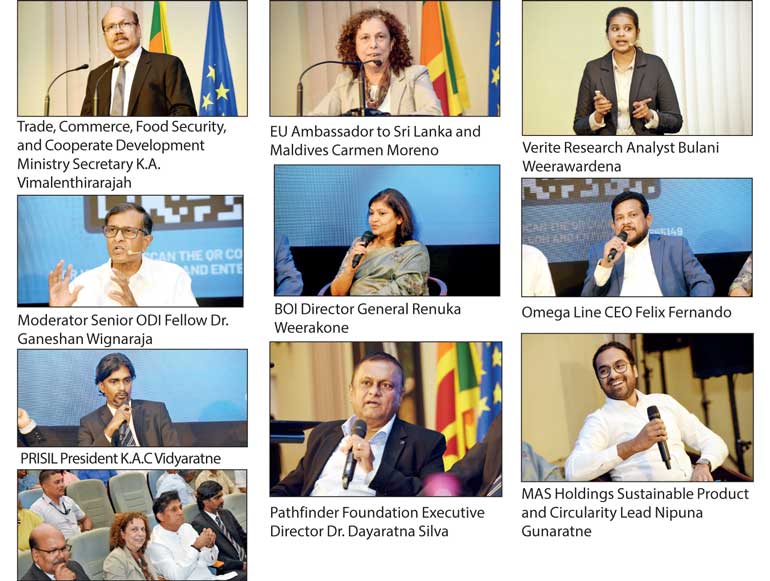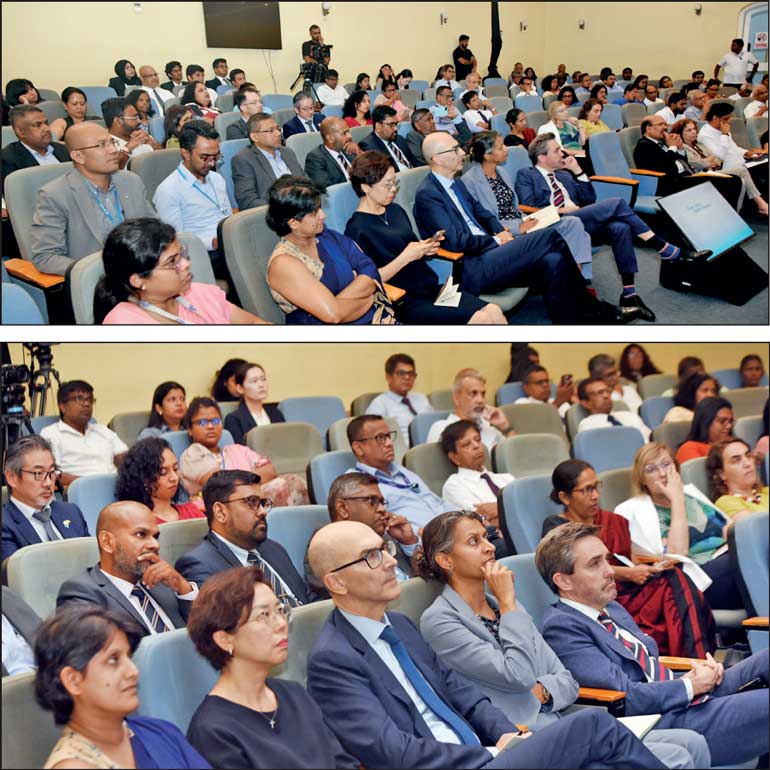Thursday Feb 26, 2026
Thursday Feb 26, 2026
Wednesday, 8 October 2025 00:06 - - {{hitsCtrl.values.hits}}


By Randima Attygalle
Leading industry experts last week underscored the urgency of strategic collaborations to support exporters, particularly Small and Medium Enterprises (SMEs), to navigate challenges and help them remain competitive in the European market.
They emphasised that if Sri Lanka’s struggling exports are to transform from challenge to opportunity, compliance needs to be tapped as a unique selling proposition (USP).
These and other useful insights were shared at a program jointly hosted by Verité Research and the EU Delegation to Sri Lanka and the Maldives under the theme ‘From Compliance to Competitiveness – Securing Sri Lanka’s Place in the Global Market.’
EU Ambassador to Sri Lanka and Maldives Carmen Moreno said: “In a global marketplace which is rapidly changing, it is pertinent that we all ask the urgent question – how to adapt, remain competitive, and sustain growth in the years ahead.”
“In some sectors, we find Sri Lankan companies with a strong competitive edge. They have embraced compliance with environmental and social standards and transformed it into global competitiveness. But the private sector cannot navigate these changes alone,” she added, citing the ‘Competitiveness Compass,’ which is the EU’s strategy to restore Europe’s dynamism and boost economic growth.
“The shift from compliance to competitiveness needs to be a national political choice. It requires public and private sectors moving together,” she further noted.
The context-setting presentation from Verité Research threw light on the three broad pillars of ‘The Great Green Shift,’ ‘Compliance as a USP for Struggling Lankan Exports,’ and ‘Why the Country Should Act Now.’
In a 2024 global survey done by PricewaterhouseCoopers (PwC) covering 31 countries and more than 20,000 consumers revealed that 85% of consumers are experiencing first-hand the disruptive effects of climate change in their daily lives, and 80% of consumers are willing to pay more for sustainably produced or sourced goods. The global survey also revealed that some consumers are willing to pay on average 9.7% more for goods that meet specific environmental criteria.
The presentation by Verité Research, citing a 2023 global study by NielsenIQ, illustrated the reputational risks of non-compliance, drawing from the experience of some of the top global brands.
Compliance is today a legal imperative which is critical for business success, operational continuity, and maintaining stakeholder trust. As of July this year, the total number of climate change cases filed globally has reached 3,099, rising from around 2,550 cases in July 2023.
Verité Research findings further demonstrated that around 20% of climate cases filed in 2024 targeted companies or their directors and officers, and more than 250 cases have been filed against companies since 2015.
As an integral component of the Great Green Shift, research also reveals that mandatory sustainability reporting is also on the rise. Corporate Sustainability Reporting Directive, an EU law, requires around 50,000 companies, including thousands headquartered outside the EU, to disclose detailed information about their Environmental, Social, and Governance (ESG) impacts and risks.
Countries smaller than ours in land and labour, such as Taiwan, Belgium, Switzerland, the Netherlands, Hong Kong, and Singapore, are today among the top 20 exporters in the world, proving that size is not a barrier for export success when sustainable compliance is adhered to.
The event also brought together an eminent panel, comprising Pathfinder Foundation Executive Director Dr. Dayaratne Silva, Board of Investment (BOI) Director General Renuka Weerakone, Plastics and Rubber Institute of Sri Lanka (PRISL) President K.A.C Vidyaratne, Omega Line CEO Felix Fernando, and MAS Holdings Sustainable Product and Circularity Lead Nipuna Gunaratne, who deliberated on compliance as a tool to remain competitive in the global market.
The panellists collectively reiterated that despite the challenges it entails, compliance is a must for the country and an opportunity to remain relevant and competitive. The experts also urged wider awareness among smaller players across industries and called for stronger Government will to support exporters to meet compliance requirements urgently so that they are not left behind. The panel discussion was moderated by Senior Overseas Development Institute (ODI) Fellow Dr. Ganeshan Wignaraja.
Pix by Shehan Gunasekera